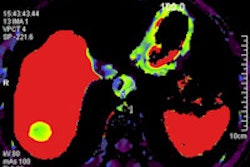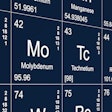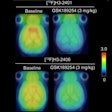Dear AuntMinnie Member,
It's ironic that even as hybrid imaging becomes more commonplace, nuclear medicine residents are facing a dismal job market, primarily due to their limitations in reading hybrid images, according to a new survey that we're highlighting in our Molecular Imaging Digital Community.
Researchers surveyed nuclear medicine residents in the U.S. to determine their attitudes toward job prospects when they enter the workforce. Many were concerned about their preparedness for employment due to their limitations in reading the CT component of hybrid molecular images. The situation has become so dire that one university in Texas even chose to discontinue its nuclear medicine residency program.
But it's not all doom and gloom. There are steps that nuclear medicine residents and programs can take to be more competitive. Find out what they are by clicking here.
While you're in the community, check out our article on a mysterious decline in nuclear myocardial perfusion imaging (MPI) studies within the Kaiser Permanente healthcare system. MPI scans dropped by half in five years, but Kaiser's status as an integrated delivery network means the usual economic reasons for such a decline -- such as reimbursement cuts -- aren't a factor. Read the story by clicking here, or visit our Molecular Imaging Digital Community at molecular.auntminnie.com.
New SGR patch
Well, that didn't take long. Dreams of a permanent fix to the sustainable growth rate (SGR) formula have been dashed, largely due to partisan wrangling in the U.S. Congress.
Instead, new legislation has been introduced that would postpone for a year a 24% cut in physician payments scheduled to go into effect on April 1. Capitol Hill watchers are calling the legislation a mixed bag for radiology, as it includes some provisions that could give the U.S. Department of Health and Human Services new powers to cut almost any physician payment. Read more by clicking here.
FDA recalls increase
Finally, the number of U.S. Food and Drug Administration (FDA) recalls of radiology devices skyrocketed after 2010, mainly due to concerns about radiation following several highly publicized incidents in which patients were overexposed to radiation.
That's according to a new report issued this month that analyzes FDA recalls over a 10-year period. The agency found that recalls more than doubled after 2010 due to heightened FDA scrutiny of radiation-emitting products, in particular linear accelerators and CT scanners.
Read more by clicking here, or visit our CT Digital Community at ct.auntminnie.com.




















